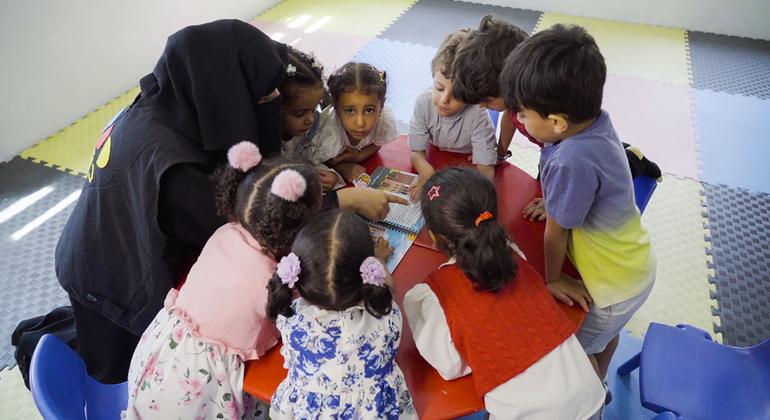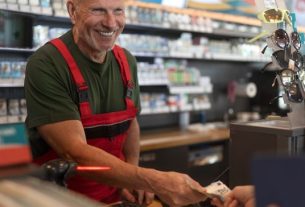But after a decade of armed conflict and amidst a severe economic depression, educational toy imports have become way too expensive for many classrooms in Yemen.
Shadia and Fatima, two young entrepreneurs in Yemen, identified this gap after participating in a training course run by the UN Development Programme (UNDP). They decided to begin a youth-led business called Dorri which would create sensory learning tools from locally sourced wood and fabric.
Alone, Dorri will not bring peace to Yemen, nor will it single handedly solve the fact that over a third of youth in Yemen are unemployed. But, according to one of the principals whose kindergarten received the toys, Dorri represents the creative potential of Yemen’s youth.
“When young people take the lead, everyone gains — children, families, schools and entire communities,” the principal said.
Youth in peacebuilding
August 12 is the International Day of Youth, a day which highlights the integral role that 1.9 billion young people worldwide play in creating sustainable futures.
This year, the day is particularly significant according to Felipe Paullier, the UN Assistant Secretary-General for Youth Affairs, because it coincides with other notable dates, including the 10th anniversary of a Security Council resolution affirming the vital role that youth play in advancing peace.
“Young people are leading change with purpose, from local campaigns to global peace efforts, building trust between cultures and creating lasting impact,” Mr. Paulier said.
Creating prosperous livelihoods
By 2050, the people who are currently under 25 will compose over 90 per cent of the global workforce, making their training and education vital to the economy and a prosperous peace.
However, in contexts plagued by conflict or in communities which face displacement, this training and education can be next to impossible to achieve.
Elijah, a Sudanese refugee who is now 27, arrived at a refugee camp in Kenya in 2015 after fleeing violence in his home country. Education proved impossible for him – while he tried to attend school for a few years, he ultimately dropped out because he could not afford the school fees.
But training was very feasible: in his informal facility – which specialises in electronic repair – he has already trained 15 young people like himself. He still hopes to do more.
“My dream is to open the biggest electronics repair facility in Kakuma that will serve the community and also empower young people without a source of livelihood to take care of themselves,” Elijah said.
An intergenerational approach
Mr. Paullier emphasised that empowering youth at a local level must entail more than just supporting initiatives like Elijah’s – rather, genuine empowerment lies in “real trust.”
“Meaningful youth participation means engaging youth as equal partners. It means intergenerational collaboration because investing in youth is not just about the future. It is about the world we live in today,” he said.
In Myanmar, this sort of intergenerational knowledge exchange has taken on a unique form – theatre. Ongoing conflict in this country has upended many livelihoods and created ripe conditions for gender-based violence.
A group of 18 young people in Mon State have formed a performance group which doubles as an educational initiative. Together, they write, direct and put on plays for neighbouring communities of all ages which discuss themes like domestic abuse.
At one performance about ongoing domestic violence, an elderly woman in the front row turned to her neighbour.
“This is my story too,” she said.
Through these performances, the young people have created a forum for an intergenerational conversation: “We’re not just performers — we are community educators, and this stage is our platform for change,” said La Min Cho, one of the performers.
Sudanese refugees in the UN-run transit centre in Renk, South Sudan.
Danger of tokenism
Despite the Security Council’s resolution, young people tend to remain excluded from policy-making decisions. Or if they are included, their participation is sometimes “tokenistic.”
Areej Hussein, the founder of a grassroots feminist organization in Sudan, has experienced the frustration of having her advocacy simply be a symbol for those in power.
“Women and girls are not just victims of war – we are peacebuilders…Enough of using women as slogans. It is time to truly listen to their leadership,” she said.
Ms Hussein has worked to change this in Sudan by mobilising women from all walks of life and empowering them to tell their stories.
And she is not alone – many young people are working around the world to change this. But for each of them, their approach to affecting real change is slightly different.
For Shadia and Fatima, it was tactile toys. Elijah inspires refugees…And for Yie Tone, the answer was theatre. “We may not have the power to change policies, but we do have the power on this stage to change our communities to a safe and equal society,” Mr. Tone said.



